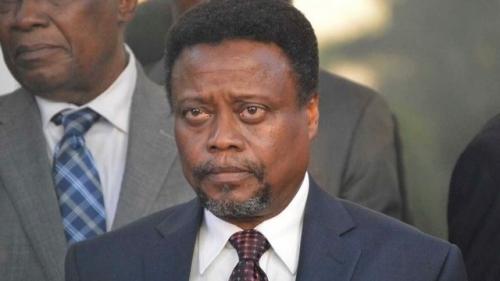Haiti’s National Transition Commission elects new interim president and prime minister
The new interim president and prime minister will administer the Caribbean country for a transitional period of 24 months, beginning this February 7.
- Información

On January 30, Haiti’s National Transition Council (CNT) elected economist and former governor of the Bank of the Republic of Haiti, Fritz Alphonse Jean, as the Caribbean country’s new interim president. The CNT, made up of 42 members from various political parties and civil society organizations, also elected former senator Steven Irvenson Benoit as the new interim prime minister. The duo will administer the country for a transitional period of 24 months, beginning this February 7.
Jean was elected with 25 votes against 15 for his only opponent, former senator Edgard Leblanc Fils, in the first round of elections. Two representatives abstained from voting. Meanwhile, Benoit beat Dr. Jean Hénold Buteau with 26 votes in favor, 14 against, and two abstentions in the second round.
Jean, who was also the former interim prime minister of the country in 2016, in a speech after his election called on all sectors of the country to engage in a national dialogue. “Today’s vote symbolizes for us the honor, respect, dignity and integrity of a transition different from those of the past,” he said.
However, Haiti’s acting Prime Minister and President Ariel Henry dismissed the establishment of another government. Henry assumed office two weeks after the assassination of de-facto president Jovenel Moïse on July 7, 2021, and has been facing mounting challenges to his administration’s legitimacy since then. He insisted that despite the CNT elections, he would not step down and would create a constituent assembly in the coming months to draft a new constitution, and subsequently organize presidential and legislative elections at the end of this year.
Last year, on August 30, 418 civil society organizations, 105 popular movements, 85 political parties and groups and 313 personalities from various fields reached an agreement known as the Montana Accord. Most of the entities part of the accord do not recognize Henry’s mandate as legal and consider that he has been imposed by foreign powers. The agreement seeks to find a solution to the crises facing Haiti with the participation of diverse sectors of society. The organizations reached a consensus on the establishment of a new transitional government, to lead the country for a period of two years, strengthen state institutions, carry out trials against embezzlers of public funds, and at the end of the period organize elections for the next government. As a part of the agreement, on December 12, 2021, the CNT was created to elect the heads of the provisional government.
Jacques Ted Saint-Dic, one of the officials of the Montana Accord Monitoring Office, reported that before the installation of the transitional government, the council will write to Henry and other organizations to nominate their representatives to form the Provisional Electoral Council of five members. Ted-Saint-Dic said that “the steps of Prime Minister Ariel Henry are outside any consensual framework,” and stressed that “if he refuses to leave power, the country will decide.”
Since 2018, Haiti has been going through a social, political, institutional and economic crisis with growing levels of violence and insecurity. The situation has worsened since the assassination of its de-facto president Moïse, which pushed the country into an unprecedented constitutional and political crisis as the current constitution doesn’t provide for a provision with regards to how to replace an assassinated president, creating a power vacuum. It remains to be seen whether the transitional period will yield positive results.
Nevertheless, the present situation, with interim leaders elected and a de-facto leader refusing to leave office, has once again brought Haiti to a similar crossroads as last year. In January 2021, following weeks of mass protests against Moïse’s unconstitutional rule, Haitian opposition political parties and social organizations appointed Supreme Court Judge Joseph Mécène Jean-Louis as the interim president to govern the country for a two-year interim period, recover it from the deepening institutional crisis caused by Moïse’s administration, and organize elections. Just as his successor Henry, Moïse had also refused to transfer power, and overstayed in office until his assassination.
Del mismo autor
- Progressive presidential ticket Petro-Márquez receives death threats in Colombia 06/04/2022
- Once again, right wing fails to impeach Peruvian President Pedro Castillo 30/03/2022
- Long before US extradition request, the streets of Honduras cried, ‘Get out JOH narco-dictator’ 17/02/2022
- Second Belmarsh Tribunal on US war crimes to be held in New York 15/02/2022
- Peruvian President swears in fourth ministerial cabinet in six months 09/02/2022
- Haiti’s National Transition Commission elects new interim president and prime minister 01/02/2022
- Colombia registers the 91st massacre of 2021 15/12/2021
- On Human Rights’ Day, UK court permits extradition of Julian Assange to US 10/12/2021
- State of siege in Guatemala is a threat to human rights 05/11/2021
- Global, moral, strategic leadership is urgent says PM of Barbados 05/10/2021








